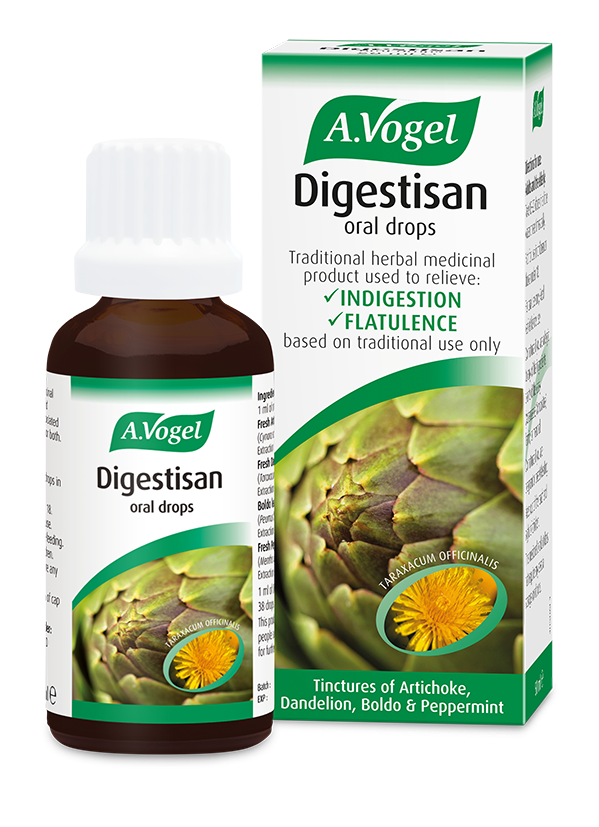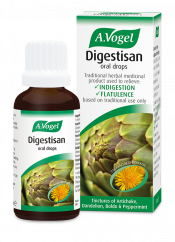Why is your liver so important?
How much do you really know about your liver? People are often aware that their liver has an important part to play in processing alcohol, and yes, this is a function of the liver – but only one of over 500 important functions! From manufacturing bile to metabolising sex hormones such as oestrogen – your liver does it all.
Our founder and renowned naturopath Alfred Vogel stated that “The liver is the regulator of your health and you are only as healthy as your liver”. The bottom line is: you wouldn’t last long without your liver and it’s up to you to look after it!
So, how can you tell how healthy it is and how can you support this important organ going forward?
Diet
The liver has many important roles in digestion. It manufactures bile which is important for the proper breakdown and utilisation of fats (discomfort after fatty foods or fatty stools is a sign that something may be amiss).
The liver is also important for energy production and regulating the levels of fats, amino acids and glucose in your blood. Carbohydrates, when consumed in excess, are converted into glycogen and stored in your liver. You then have this store available which can be converted back into glucose, providing a quick fix of energy whenever you need it.
To help support the liver it is important to eat a diet rich in fresh ingredients. Fruit and vegetables are rich in essential vitamins, minerals and antioxidants which help support the functions of your liver. Your liver is also responsible for processing and storing many vitamins and minerals from your diet. Fat soluble vitamins (A, D, E & K) are of particular importance as they are dependent on bile for their absorption.
Too many refined carbohydrates such as white pasta, bread and sweet treats put your liver under pressure as do processed and fatty foods. We need good-quality protein to help balance your blood sugar and provide amino acids in order for your liver to manufacture important antioxidants, enzymes and proteins to be used in various chemical reactions. Ditch the bad carbs and make sure you incorporate some good-quality protein into every meal.
Body Weight
Being overweight puts your liver under strain. Obesity puts you at a greater risk of non-alcoholic fatty liver disease (NAFLD) which is now the most common liver disorder in developing countries.
Excessive fat consumption poses a greater risk of fat accumulation in the liver which over time can give rise to inflammation and scarring. We want to avoid this at all costs as the scar tissue can gradually replace the healthy cells of the liver. A BMI within the healthy range means you are less likely to develop NAFLD, although diet and other factors are still hugely important.
Exercise
Exercise has a host of benefits and most of you can probably admit you could be doing more. Exercise is a positive first step in reducing your body weight which is always a plus for your liver.
Additionally, exercise helps to increase your heart rate and gets your blood pumping quicker around your body, which means all your major muscles and organs too. Oxygenated blood delivers oxygen and essential nutrients to the liver and in return your hepatic veins filter away waste materials. The quicker and more efficient this system is the healthier your liver is likely to be – get that blood pumping!
Alcohol & Toxins
Alcohol consumption has a big impact on your liver as do other toxins including medication, drugs and chemicals. Many people take medication on a daily basis and your liver has to deal with each and every pill you pop. Toxins are sent to the liver where they can be broken down and utilized. However, in excessive amounts, your liver struggles to cope and the cells of the liver can become damaged.
Reduce the load on your liver by reducing alcohol and medication consumption wherever possible. Overuse of painkillers such as paracetamol can be particularly damaging which many people don’t consider.
So, what about your exposure to toxins? Have you ever considered how ‘toxic’ you might be? From the air around you, to the water you drink, the food you eat, the soil in which your food grows and the beauty, cleaning and gardening products you use – toxins are everywhere. This can put an increasingly toxic load on your body and you guessed it – the liver takes the brunt of it. Visit our page on how to detox your liver for ways in which you can begin to reduce these toxins.
Warning signs
There are some warning signs to be aware of which can help indicate just how healthy your liver is. However, beware, as a vulnerable liver can go relatively undetected for some time so symptoms often don’t appear until the damage has already been done.
Some typical signs which can arise and suggest your liver is struggling are as follows:
- Stomach pain and swelling – Your liver is located on the upper right side of your abdomen, tucked in under your rib cage. Pain in this area could indicate something isn’t quite right. A stressed liver can swell (excess water can accumulate too) which can also cause pain or discomfort in the surrounding areas. Persistent stomach pain and / or in certain situations (such as after eating a particularly fatty meal) shouldn’t be ignored
- Jaundice – The liver has an important role in processing your blood and in doing so, bilirubin, a substance produced from the breakdown of old red blood cells is excreted from your body. However, if the liver isn’t functioning correctly, bilirubin is often not excreted properly and can build up in your body. The result is a yellowing of the skin and whites of the eyes which is known as jaundice
- Altered bowel habits – A change in bowel habits (such as diarrhoea or constipation) can be a sign that your liver isn’t working quite as it should. The liver is involved in the breakdown and absorption of fats and if this isn’t happening as it should, fat can pass into your bowels and can give rise to pale, fatty stools and diarrhoea. On the hand, sluggish bowels may be associated with a sluggish liver which can turn into a vicious cycle. The longer stools stay festering in the intestine, the more likely toxins are reabsorbed and we know where they get sent! This puts the liver under more pressure and often means it takes longer to process the food we are digesting in the first place
- Skin issues – As we now know, the liver is responsible for processing and breaking down toxins. However, if your liver is struggling to do its job properly – these toxins have to be eliminated elsewhere and often your skin is a port of call. For this reason unexplained, itchy, irritated skin can be an indication your liver is under stress. Your skin is often a reflection of how healthy you are (organs included)!
- Nausea – Nausea can be a result of many issues but it could be a warning sign with regards to your liver. Take special note if the nausea occurs after eating particularly fatty foods
- Fatigue – Again, fatigue can occur for many reasons but an overload of toxins in your body as a result of a dysfunctional liver is one of them. As the liver is also involved in converting your food into energy (particularly the utilisation of carbohydrates which is crucial fuel for your brain and metabolically active muscles) this is another reason why poor liver function can leave you feeling exhausted (physically and mentally). If fatigue is an issue take a visit to your doctor who can run some tests and begin to rule out other possible causes.
Can any herbal remedies help?
Although good diet and lifestyle practices are vital for the health of your liver, you can also support your liver with some herbal remedies.
Bitter herbs are also beneficial for digestion. Research has shown that artichoke has favourable effects on cholesterol levels (managing these is an important function of the liver) and participants saw a significant reduction in their cholesterol while using artichoke over a 12 week period [1].
The root and leaves of the bitter herb dandelion also support the functions of the liver in that the root helps encourage the release of bile and the leaves are a gentle diuretic which helps support the excretion of toxins from the body.
Finally, the herb milk thistle may also be beneficial to the liver; it is rich in a component called Silymarin which acts as a powerful antioxidant.
[1] Bundy R et al. Phytomedicine 15 (2008), 668-675
How can my doctor help?
If you are concerned about the health of your liver it is always wise to pay your doctor a visit. Your doctor can run a liver function test which looks for an increase in liver enzymes. However, it is important to mention that often this is only detected when some damage has already been done. It’s crucial that you do your best to avoid getting to this stage and take good care of it!








